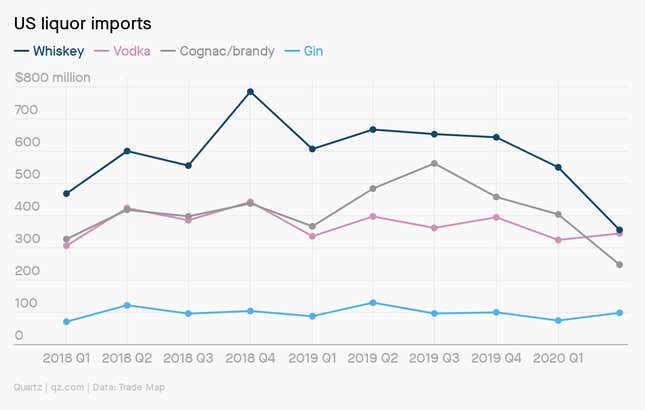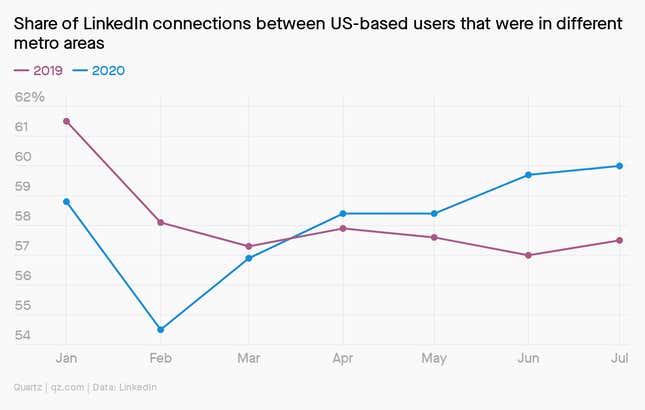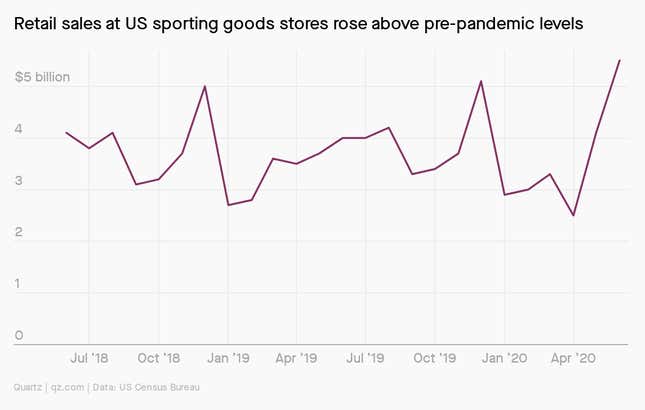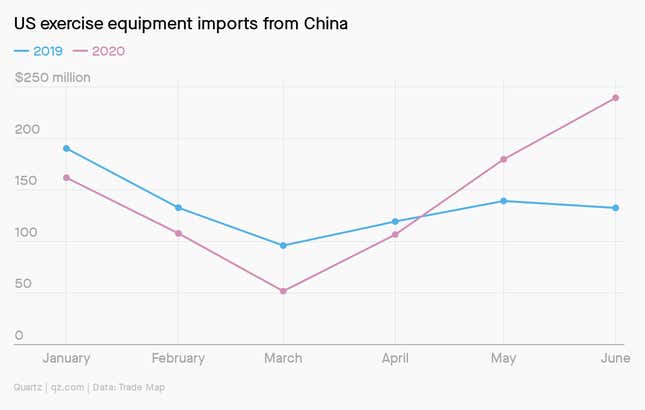Hello Quartz readers,
Today we begin with a question:
Continually, I see people wearing their masks below their nose. I am no medical professional, but the last time I looked, I did breathe through my nose. What are these people thinking?
You’re right, reader! We do indeed breathe through our noses, and viral particles can gain access through our nose, mouth, or eyes after we touch our face or breathe while in close contact with someone who is contagious. That’s why masks are effective, and most effective when worn correctly: covering both the nose and mouth, with as few gaps as possible.
As for what the chincompoops are thinking, we couldn’t tell you. We can tell you what they’re not thinking, which is, “How might I do right by my fellow citizens today?”
Okay, let’s get started.
Picking up the check
If you want to change someone’s behavior, you can try all manner of sophisticated manipulation techniques. Or you could simply pay them.
The UK government put this straightforward and highly effective technique into action in August, by offering to foot half the bill for restaurant meals, up to £10 ($13.20) per person per meal. The policy, called “Eat out to help out,” was introduced to support Britain’s flailing restaurant industry, which saw a 60% drop in sales during lockdown. Restaurants reopened in July.
Like many governments around the world, the UK is grappling with how to influence public decisions in the face of coronavirus. Offering to pay restaurant bills, other than making intuitive sense, is backed by behavioral scientists’ assessments of why bargains appeal.
“Happiness is often a relative judgment about the distance between where we are and where we could have been,” behavioral economist Dan Ariely wrote in the Wall Street Journal in 2015. “If we think that something could have been better, we feel bad, and if we think that something could have been worse, we feel good by comparison. So when we buy something at a great discount, it is easy to compare our situation to the alternative scenario of paying full price—and we feel fantastic.”
Ariely explored the psychological impact of bargains in his 2017 book, Dollars and Sense. He also showed that people tend to follow in their own footsteps by repeating purchases and actions. This suggests that once people have had a meal out on the government’s dime, they’re more likely to return to restaurants in the future.
Of course, using behavioral science to set policy is far from foolproof. In mid-March, as lockdowns were put into effect around the world, scientific advisors within Britain’s behavioral insight team worried that the public would tire of such restrictions. So instead of shutting down large public gatherings, the government simply encouraged people to wash their hands regularly.
Later that month, 600 behavioral scientists wrote an open letter warning that not enough is known about behavioral fatigue to inform a coronavirus policy. The UK eventually went into strict lockdown on March 23; if lockdown had started a week earlier, a government scientific advisor later said, 20,000 lives could have been saved.
Lowering the bar
US liquor imports are more than tipsy. In the second quarter of 2020, the US brought in about $1.8 billion in liquor from abroad, down from $2.5 billion in 2019, a drop of nearly 30%. The decline has been most acute for whiskey imports, which are down by almost 50%.

Spirits industry veteran Adam Levy says the decline is due to three main factors:
- US bars and restaurants are either closed or handling fewer customers, which reduces demand for all types of liquors, especially high-end liquors used for cocktails.
- The Trump administration slapped a 25% tariff on Scotch and Irish whiskeys and other European-made liquors in October 2019.
- The rising quality and variety of US-made liquors, particularly bourbons, have made less Americans less likely to look to foreign brands.
Mixed connections
With fewer people going into offices, cafes, and other public spaces, the chances to make connections locally are decreasing. At the same time, people are spending more time communicating online, where geography is practically irrelevant.
The changes can be clearly seen in LinkedIn data: Connections between people in different metro areas started to grow after the pandemic hit the US. By July, about 60% of LinkedIn connections in the US were made with people outside of the user’s metropolitan area. That’s up from 57.5% last year.

LinkedIn chief economist Karin Kimbrough believes much of the increase in non-local connections is from matches between workers looking for remote jobs and people at the headquarters of the companies that are offering them. Between March and May, LinkedIn saw a 180% increase in remote job postings.
Sporting, good
In the US, there’s so much demand for dumbbells they can be near impossible to find for sale online. In fact, overall sales at sporting goods stores are soaring above pre-pandemic levels, according to data from the US Census Bureau.
In June—the most recent month with figures available—total retail sales at US sporting goods stores reached $5.5 billion, up from $4 billion in June 2019.

Retailers are still struggling to keep up with demand. That’s because the lion’s share of the US’s imported exercise equipment comes from China—some 65% in 2019—where factories were shutting down at the beginning of 2020. The resulting production slowdown caused bottlenecks for all of sorts of imports, including home exercise equipment.

Even as gyms start to reopen, the short-term shift to livestreamed and on-demand exercise will have long-term consequences for how we work out. Quartz members can read more about this pumped-up pivot in our field guide to home fitness.
Not a member yet? You’re in luck. We extended our summer sale for an extra week, which means you can sign up and now and take 50% off your first year.
Supermarket leap
They’re sprawling, they’re crowded, they’re overwhelming, and they’re notorious for tricking you into getting more than what was on your list. To some, supermarkets represent the ultimate in exhausting chores, but in pandemic times, they’re a beacon of light.
The shift in consumer spending habits has revitalized flagging supermarket sales, although new safety protocols and increased interest in online ordering and delivery have come at a cost. While digital demand may or may not continue post-pandemic, our shopping experience likely won’t be the same.
Let the Quartz Weekly Obsession take you up and down the aisles.
Essential reading
- The latest 🌏 figures: 25.5 million confirmed cases; 16 million classified as “recovered.”
- Keeping your cool: From jets to “freezer farms,” logistics operators are preparing for a vaccine.
- Remote control: Most Indian parents don’t want to send their kids back to school until the pandemic is over.
- Gag reflex: US businesses are issuing rules to stop workers from talking about Covid-19 cases.
- Testing our patients: The CDC is giving murky guidance on testing for those without symptoms.
Our best wishes for a healthy day. Get in touch with us at needtoknow@qz.com, and live your best Quartz life by downloading our app and becoming a member. Today’s newsletter was brought to you by Olivia Goldhill, Dan Kopf, Marc Bain, Jenni Avins, Stevie Borrello, and Kira Bindrim.